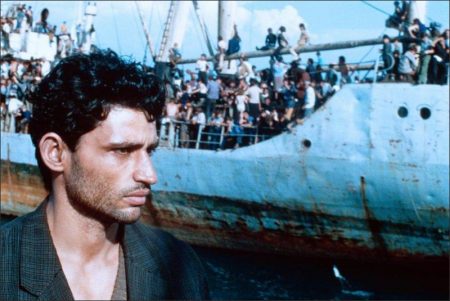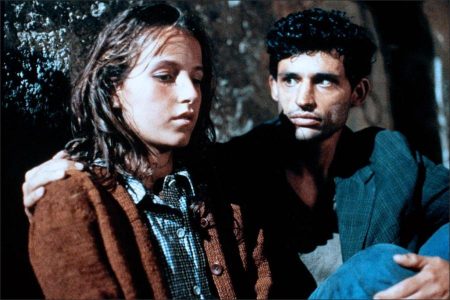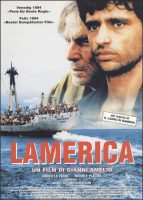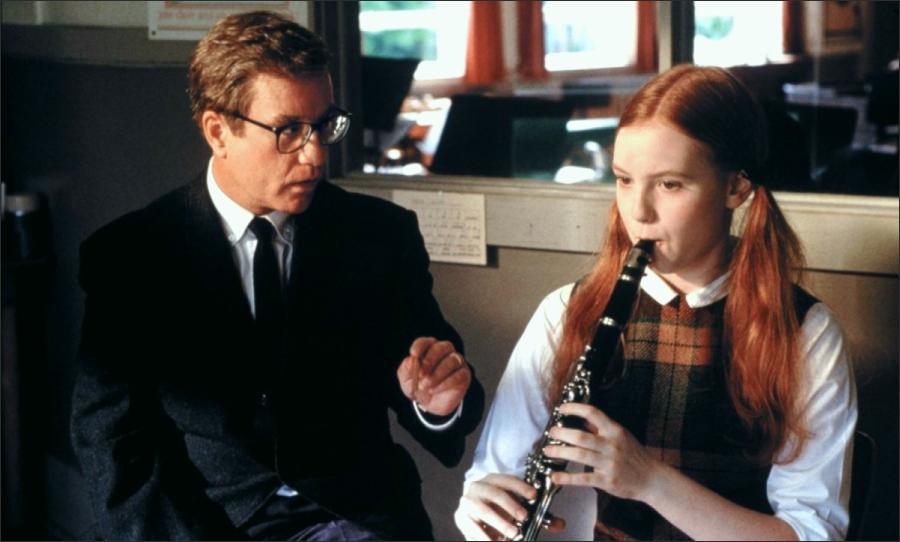Taglines: A scam on the vulnerable.
Lamerica movie storyline. Two Italian racketeers come to Albania just after the fall of the communists to set up a fictive firm and pocket the grants. They need a stooge. They choose an old one in a jail : Spiro. But the youngest italian, Gino, once alone with Spiro, encounter a few problems. Far from his roots, loosing his identity in deep Albania, he begins to change…
Lamerica is a 1994 Italian drama film directed by Gianni Amelio. It entered the competition at the 51st Venice International Film Festival, in which Amelio won the Golden Osella for Best Director. The film was selected as the Italian entry for the Best Foreign Language Film at the 67th Academy Awards, but was not accepted as a nominee.
Film Review for Lamerica
Gianni Amelio’s L’America is a biting, profoundly moving drama that illustrates how the downtrodden of society, beneath the hoopla of political change and the redistribution of power, are fated to do little more than shift from one kind of exploitation to another.
The specifics of the scenario relate to the downfall of communism in Europe. The year is 1991, and Albania has been liberated from the iron hand of the hammer and sickle. The Albanian people are hungry and desperate; thousands of them are determined to make their way to Italy, where they hope to find employment. In the decades leading up to the events in the film, political dissidents in Albania were incarcerated in labor camps.
One of them is seventy-year-old Spiro Milkami (Carmelo di Mazzarelli), a bedraggled, feeble-minded man who is ironically not Albanian but an Italian farmer who had deserted the army in the 1940s. Spiro becomes the pawn in a scheme concocted by two Italian businessmen, Gino (Enrico Lo Verso) and Fiore (Michele Placido), who plan to purchase a shoe factory, with the assistance of an unscrupulous government official, and set up a fraudulent corporation that will allow them to squeeze a fortune out of Albania’s economic chaos.
In order to observe the rules of privatization, an Albanian must be involved in the venture. Fiore has discovered Spiro, who seems the perfect tool and fool: a passive, mindless old man who can be fitted into a suit and paraded about whenever necessary. Confused and senile, Spiro is caught in a time warp: he thinks he is still twenty years old and is obsessed with returning to Italy, and to his wife, because it is time to harvest his olives. If she is not already dead, Spiro’s wife is now an elderly woman—but in his mind she remains as young as when he last saw her.
The crux of L’America centers on the relationship between Spiro and Gino, the younger of the businessmen. Spiro escapes from the orphanage where he had been left by Gino and Fiore, and Gino sets out after him across the barren Albanian countryside. Along the way, this insolent young capitalist is stripped of his jeep and belongings— and even his clothing.
He comes to know the feeling of poverty and statelessness and develops an affinity for the plight of the Albanian people, as well as sympathy for Spiro’s hopeless quest. Gino eventually is arrested and jailed because of his alliance with the corrupt official. He has been deserted by Fiore, who has left the country. Gino’s passport is impounded, and he finds himself one of the nameless, faceless masses of refugees desperate to reach Italy. At the finale, he and the ever-hopeful Spiro are reunited on a refugee ship. Gino comes to recognize the force of Spiro’s confidence, and the potency of his dreams.
L’America is a film in the neorealist tradition in that Amelio’s concerns are profoundly political and humanist. The scenario condemns the abuse of power by the avaricious businessmen; back in the 1940s, Gino and Fiore would have been fascists rather than capitalists. Similar to the neorealist classics of Rossellini and De Sica, in L’America Amelio spotlights the individual’s thirst for the barest necessities amid a landscape of political, economic, and moral disorder. While he has not made a documentary, his film reflects a heightened sense of reality derived from the experience of life. The film was shot on location and mixes professional actors (Lo Verso and Placido) with non-professionals (di Massarelli, an eighty-year-old retired fisherman-laborer-janitor making his screen debut).
What distances L’America from the earlier neorealist films lies in the questions the film poses. Some are practical to the individual: What will the Albanian refugee who does make it to Italy find there? Is Italy truly a promised land? Or is the quality of life more reflective of the inane programs constantly broadcast on Italian television?
These queries are answered by the declaration that it is better to wash dishes in Italy than to starve in Albania. In Italy, the film flatly states, young men only die in car accidents. But L’America poses other questions that are more elusive, and more universal: Have Albanians (or, for that matter, Romanians, East Germans, or Poles) found freedom, after decades under communist rule? Or, has a new kind of tyranny, that of capitalism and greed, replaced the old?
Finally, in L’America Amelio touchingly captures the feeling of what it must be like to be a refugee. His is a story of the dreams and aspirations of people who, in reality, are so downtrodden that they have no logical reason to latch onto hope. It is Amelio’s contention that, in the end, all the powerless have to cling to are their dreams. Even if they are irreversibly unrealistic, as is the case with Spiro, dreams still must be grasped onto because they are all that will help sustain life.
Lamerica (1995)
Directed by: Gianni Amelio
Starring: Enrico Lo Verso, Michele Placido, Piro Milkani, Carmelo Di Mazzarelli, Elida Janushi, Sefer Pema, Idajet Sejdia, Marieta Ljarja, Elina Ndreu, Liliana Subashi
Screenplay by: Gianni Amelio, Andrea Porporati, Alessandro Sermoneta
Production Design by: Giuseppe M. Gaudino
Cinematography by: Luca Bigazzi
Film Editing by: Simona Paggi
Makeup Department: Esmé Sciaroni:
Music by: Franco Piersanti
Distributed by: New Yorker Films
Release Date: September 9, 1994 (Italy), September 8, 1995 (United States)
Hits: 167





